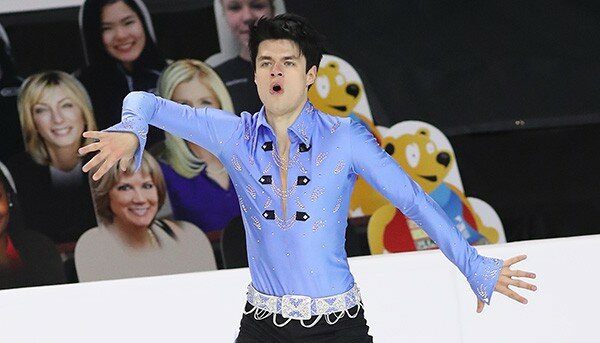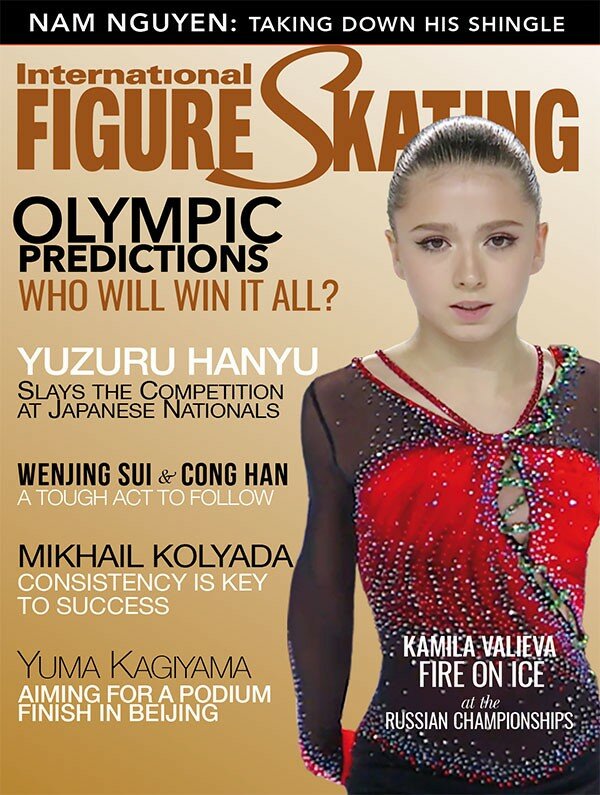

Photo: Robin Ritoss
It has been a long and winding road for Yaroslav Paniot to arrive at where he is today.
Born in Odessa, Ukraine, his career began, like so many others, with his parents taking him to a local skating rink at age 6. Four years later his family moved to Moscow and Paniot began taking lessons with Alexei Tchetverukhin. “I wanted to improve my skating skills and become a better skater and in Ukraine at that time it was not possible because we did not have any very good coaches,” said Paniot. “I trained there for three years and it was very successful. I got my triple jumps in Russia and that was very good.”
In 2011, the family returned to Ukraine, settling in Kiev, and Paniot began training with Viacheslav Zagorodnuik, the 1999 European champion. Zagorodnuik, who had previously coached in the U.S., relocated to California in 2013 and Paniot and his mother followed.
Paniot spent five seasons on the Junior Grand Prix circuit starting in 2012. His only success was a third-place finish at an event in Germany in 2014. He also competed at the senior level that season, finishing 16th at Europeans and 24th at the World Championships.
In January 2016, Paniot made another coaching change, moving to work with Nikolai Morozov. “I decided to switch to Nikolai because the then president of the Ukraine federation offered this opportunity to me. It was OK. My skating skills improved a lot because Nikolai is the best at that, and I learned a lot. My jumps did not improve because Viacheslav was the best jumping coach I ever had.”
That coaching arrangement lasted for a season but Paniot, like so many other skaters who have worked with Morozov, became disillusioned by the constant travel. “I was about 17 or 18 years old at the time I left Nikolai. He was travelling around the world a lot and it was very complicated to travel with him all the time. That affected my training process because he would get invitations to go everywhere and it was very tiring for me.”
Paniot returned to the U.S. and in the spring of 2017 started working with Tammy Gambill in Riverside, California. The fact that she was stationary and worked in only one place was what Paniot said he needed at the time. He claimed his first medal at the senior level in 2017, finishing second at the Philadelphia Summer International, where he wrote a small piece of history as the first European man to land a quad flip in competition. A seventh-place finish at Nebelhorn Trophy in September guaranteed him a spot at the 2018 Olympic Winter Games. Paniot finished in 30th place in the short program in PyeongChang and did not advance to the free skate. It was an experience he said he would rather not remember.
His coaching arrangement with Gambill also had its shelf life, and in the fall of 2018 Paniot returned to train with Zagorodniuk in Lake Forest, California.
Paniot was assigned to NHK Trophy in November 2018. He told the Ukraine federation that he was injured and wished to withdraw from the competition. However, as the federation had already paid for the airfare and other expenses, officials insisted he compete. “That was not a very good situation between me and the Ukraine federation. I thought that maybe we could make a deal: If I did NHK Trophy they would send me to Europeans and Worlds without having to do nationals so I could heal my injury. So that was the deal,” Paniot explained. “I went to NHK and obviously I did not do very well. Then, after the competition, they called me and said, ‘OK, Yaro, now we will see you in Kiev for nationals.’ I asked them about our deal and they said, ‘What deal? And that was it. I told them it was not fair because we had a deal. That is when I decided to switch to the U.S.”
In 2019, he finished second at both the sectional and regional competitions. That success earned him his first trip to the U.S. Championships in 2020, where he finished 10th.
When the coronavirus pandemic struck a few months later, the rink where he trained in California was shuttered. Paniot said the break gave him time to think about what he wanted to do with his career. In July, he made another coaching change, this time moving to train with Todd Eldredge at the Great Park Ice & FivePoint Arena in Irvine, California. “I was sitting at home during the quarantine with nothing to do, and I was thinking about how I could be better,” he said. “I really wanted to skate at Great Park because it is so nice and I think Todd is the best coach at this rink. I wanted to have better conditions; I wanted to have a lot of room and space, and everything is better there than at Lake Forest. That is why I switched to Todd.”
Paniot headed into the 2021 U.S. Championships much better prepared than he had ever been before. When asked how he felt as he took to the ice for the short program, Paniot said he felt that “everything was going to plan. I was a little nervous going into the short because I had not had any competitions since the previous nationals.” He finished fourth in the short program, 17.18 points behind Jason Brown who sat in third.
Paniot delivered the performance of a lifetime in the free skate — set to a medley of Elvis Presley tunes — reeling off two quad flips, one in combination, a quad toe and five more triple jumps. Spins and the step sequence have always been his shortfall and on this night one spin was graded Level 4 with the others at a Level 3. However, he received positive Grades of Execution scores for all 12 elements and finished third in the free skate, ahead of Jason Brown. But it was not enough to lift him over Brown in the final tally and Paniot finished in fourth place overall, 9.95 points out of third place.
“I wanted to do a clean program and I did not want to make any mistakes,” the 23-year-old said. “I was not allowing myself any chance to make a mistake. As I was going into my quad flip in the short, I was not thinking about the jump. I was thinking about something different that was not related to my program and my thoughts affected my jump. But in the long I was thinking only about the jump. A few jumps in the short program were a little shaky but in the long I really was focusing on every step. I felt a lot more confident and my jumps were a lot better in the long.
“At the end of the program I felt very good and very relaxed because I could finally breathe and be happy. When I was taking my bow I was thanking all the people who helped me. With every shake of my head I was thanking my parents, Todd and Misha Ge, my choreographer. It was a big achievement for me to beat Jason in the free.”
When asked who came up with the concept for the long program, Paniot said the idea came from Eldredge. “He was like ‘let’s try Elvis.’ He thought I would look amazing in this program. I agreed it was a great idea. He contacted Misha and they came up with the music, ‘Heartbreak Hotel,’ ‘Hound Dog,’ and ‘Falling Love With You.’ I was very excited about this program. It is my best so far. In my opinion, both my programs are very good and they are at the same level.”
Paniot said he has no input when it comes to his costumes, which are designed by a Russian seamstress, Olga Gleizer, who lives in Laguna Beach. “I almost don’t have any say as my mother is in control of that with Olga. They don’t respect anything I say when it comes to my costumes. Only they make the decisions.”Looking ahead to next season, Paniot said he plans to get a new short program, having skated the current one for the past two seasons. He plans to keep the long as he has not yet had the opportunity to perform it in front of an audience.
Though his program component scores at the 2021 U.S. Championships were almost 20 points higher than he had ever scored before, he knows he needs to focus on developing his skating skills and improve his spins and the step sequences. Paniot considers the marks he received for those elements at nationals to be fair, and said he will “try to count the spin revolutions better in the future. Sometimes you lose points when you start counting the revolutions too early and sometimes you start counting them a little later.”
Next season it will be a brand new ball game for Paniot. Ukraine has a policy that all athletes who compete at an Olympic Games are subject to a three-year waiting period to be released. In mid-January, the Ukraine federation confirmed to Tatjana Flade/IFS that Paniot would be released on May 21, 2021, which will open the door for him to represent the U.S. at international competitions next season. While he believed he would be released sometime in the spring, he was unaware of the actual date.
Having lived in the U.S. for almost a decade, his application for U.S. citizenship is already in the works and he expects to receive it in late 2021. “I have very big expectations for myself for next season. I want to reach the highest level,” said Paniot. “I will do everything I can to go to the (2022) Four Continents, Olympics and Worlds.”
RELATED CONTENT:
2020-21 COMPETITION CALENDAR



